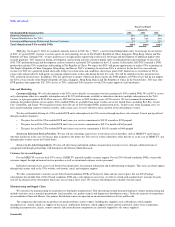TiVo 2005 Annual Report Download - page 20
Download and view the complete annual report
Please find page 20 of the 2005 TiVo annual report below. You can navigate through the pages in the report by either clicking on the pages listed below, or by using the keyword search tool below to find specific information within the annual report.
Table of Contents
From time to time, we receive letters from third parties alleging that we are infringing their intellectual property. Regardless of their merit, we are
forced to devote time and resources to respond to these letters. In addition, if any of these third parties or others were to sue us, our business could be harmed
because intellectual property litigation may:
• be time-consuming and expensive;
• divert management's attention and resources away from our business;
• cause delays in product delivery and new service introduction;
• cause the cancellation of new products or services; or
• require us to pay significant royalties and/or licensing fees.
The emerging enhanced-television industry is highly litigious, particularly in the area of on-screen program guides. Additionally, many patents
covering interactive television technologies have been granted but have not been commercialized. For example, we are aware of multiple patents for pausing
live television. A number of companies in the enhanced-television industry earn substantial profits from technology licensing, and the introduction of new
technologies such as ours is likely to provoke lawsuits from such companies. A successful claim of infringement against us, our inability to obtain an
acceptable license from the holder of the patent or other right, or our inability to design around an asserted patent or other right could cause our manufacturers
to cease manufacturing DVRs that enable the TiVo service, our retailers to stop selling the product or us to cease providing our service, or all of the above,
which would eliminate our ability to generate revenues.
Under our agreements with many of our manufacturing and licensing partners, we are obligated to indemnify them in the event that our technology
infringes upon the intellectual property rights of third parties. Due to these indemnity obligations, we could be forced to incur material expenses if our
manufacturing and licensing partners are sued. If they were to lose the lawsuit, our business could be harmed. In addition, because the products sold by our
manufacturing and licensing partners often involve the use of other persons' technology, this increases our exposure to litigation in circumstances where there
is a claim of infringement asserted against the product in question, even if the claim does not pertain to our technology.
Pending intellectual property litigations. On August 5, 2004, Compression Labs, Inc. filed a complaint against TiVo, Acer America Corporation,
AudioVox Corporation, BancTec, Inc., BenQ American Corporation, Color Dreams, Inc. (d/b/a StarDot Technologies), Google Inc., ScanSoft, Inc., Sun
Microsystems Inc. Veo Inc., and Yahoo! Inc. in the U.S. District Court for the Eastern District of Texas alleging infringement, inducement of others to
infringe, and contributory infringement of U.S. Patent No. 4,698,672, entitled "Coding System For Reducing Redundancy." The complaint alleges that
Compression Labs, Inc. is the owner of this patent and has the exclusive rights to sue and recover for infringement thereof. The complaint further alleges that
the defendants have infringed, induced infringement, and contributorily infringed this patent by selling devices and/or systems in the United States, at least
portions of which are designed to be at least partly compliant with the JPEG standard. On February 16, 2005, the Judicial Panel on Multidistrict Litigation
consolidated this and seven other related lawsuits and coordinated pretrial proceedings in the United States District Court for the Northern District of
California, where pretrial proceedings are currently ongoing. On January 31, 2006, the United States Patent Office granted a request for reexamination of the
patent in question. We intend to defend this action vigorously; however, we could be forced to incur material expenses in the litigation and, in the event there
is an adverse outcome, our business could be harmed.
16
























